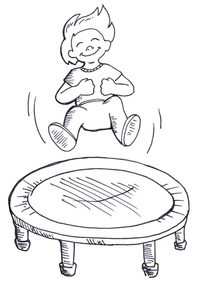
Imagine vigorously jumping on one of those small ‘personal’ trampolines. Maybe you’ve actually done that, right? Whether or not you’ve done it, you probably would agree that you want the membrane to be STRONG. You don’t want to get a good bounce going and hear (uh-oh!) a ripping noise. The membrane of my imagined trampoline is “emotional resilience”, fondly known to me as Emotional Muscularity. Sturdiness is required: it needs to be thick and strong so it can take the immense weight of a vigorous pounding. It needs to hold when I am overwhelmed with grief over someone’s death, or frightened about illness. Anger will have me pounding up and down on it in a ‘cannon ball’ scrunch. Boing, boing, boing!!
There was a time in my life when the membrane was tissue thin and I’d plunge right through into helplessness, incompetence, wailing and flailing, and fear of my own emotions. (Run away! Run away! Monte Python reference: the Killer Bunny.) I was not confidant that I could cope—not because of the situation I was in, as dire and ugly as it might have been, but because of the emotional intensity. Yet fearing one’s own feelings (I can’t handle it!) is a formula for chronic anxiety. Imagine: feeling unable to cope with your own emotions! Wow, most of us can relate to this even if we don’t want to admit it.
Intense emotion is natural, supplied to us at birth, and part of the human experience. Emotion is simply information! Problematic is when we act upon intense emotion. You can rage, without hurting anyone. You can sob and weep, and ride that river of emotion until your tear ducts are dry, without dying. You can let yourself feel any number of emotions without becoming a ‘bad person’ or splitting into a thousand pieces—as long as you don’t act upon those emotions (“I could just kill her!”) or cross the line into being unable to differentiate between what is real and unreal (psychotic disorder, acute PTSD). After all, you are supplied with a great range of emotional intensity to facilitate having your life, and living it richly.
If you doubt the strength of the membrane on your personal trampoline, you will be anxious. (Will it hold??) As you do the work of tolerating and even exploring a wider range of emotion, you build emotional muscularity and slowly thicken the supportive membrane. Journal into your doubt, talk with a trusted friend or seek out a therapist to gain assistance with daunting emotional material. Don’t exist in fear of being overwhelmed or destroyed by your own emotions! They are actually here to serve you. Don’t be afraid: you can do it! Or rather--be afraid, and yet believe you can do it. Seek the level of help that works for you, and remember that nothing you experience is outside of the realm of being human. We are all in this together; let us support one another.
There was a time in my life when the membrane was tissue thin and I’d plunge right through into helplessness, incompetence, wailing and flailing, and fear of my own emotions. (Run away! Run away! Monte Python reference: the Killer Bunny.) I was not confidant that I could cope—not because of the situation I was in, as dire and ugly as it might have been, but because of the emotional intensity. Yet fearing one’s own feelings (I can’t handle it!) is a formula for chronic anxiety. Imagine: feeling unable to cope with your own emotions! Wow, most of us can relate to this even if we don’t want to admit it.
Intense emotion is natural, supplied to us at birth, and part of the human experience. Emotion is simply information! Problematic is when we act upon intense emotion. You can rage, without hurting anyone. You can sob and weep, and ride that river of emotion until your tear ducts are dry, without dying. You can let yourself feel any number of emotions without becoming a ‘bad person’ or splitting into a thousand pieces—as long as you don’t act upon those emotions (“I could just kill her!”) or cross the line into being unable to differentiate between what is real and unreal (psychotic disorder, acute PTSD). After all, you are supplied with a great range of emotional intensity to facilitate having your life, and living it richly.
If you doubt the strength of the membrane on your personal trampoline, you will be anxious. (Will it hold??) As you do the work of tolerating and even exploring a wider range of emotion, you build emotional muscularity and slowly thicken the supportive membrane. Journal into your doubt, talk with a trusted friend or seek out a therapist to gain assistance with daunting emotional material. Don’t exist in fear of being overwhelmed or destroyed by your own emotions! They are actually here to serve you. Don’t be afraid: you can do it! Or rather--be afraid, and yet believe you can do it. Seek the level of help that works for you, and remember that nothing you experience is outside of the realm of being human. We are all in this together; let us support one another.




